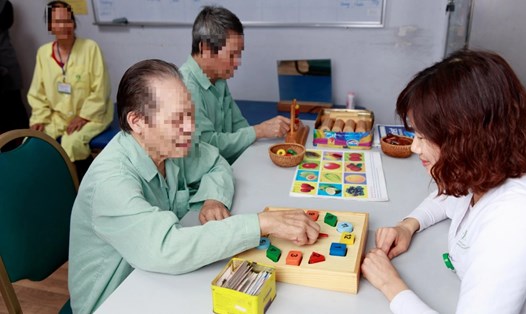One evening in mid-March 2023, an 88-year-old man living in Ho Chi Minh City kept shouting the name of the caregiver. He said that he saw strangers in the house, even imagined chatting with the deceased relatives. The family panicked and took him to the hospital for examination, where he had previously been treated for hypothyroidism due to hypoglycemia, high blood pressure and memory loss.
When he was clinically examined, he was still conscious, remembering the names of the children, but could not remember his current age at the time, only remembering his age when he was healthy. He eats poorly, often feels sad, anxious and always feels lonely.
Dr. Le Thi Thuy Uyen - Deputy Head of the Department of Neurology, Thong Nhat Hospital, Ho Chi Minh City, who directly examined said: "The patient not only has memory loss but also shows signs of mental disorder, such as hoangage, aobies, anxiety, depression. These are common symptoms at the advanced stage of dementia.
Intellectual impairment is a syndrome caused by neurodegeneration, causing cognitive decline and affecting the ability to live independently. Alzheimer's disease is the most common. In addition to symptoms such as memory loss, language loss, orientation, and management, patients may also experience behavioral changes and personality that are often underestimated in the early stages.
According to Dr. Thuy Uyen, mental disorders can manifest as indifference, depression, panic, hallucinations, insomnia, or even personality changes. There are old men who were calm before, but now playing and being too messy, the changes cannot be explained if they do not think about the causes of neurological diseases, said the doctor.
A study in Vietnam in 2023 showed that up to 95.1% of patients with dementia have symptoms of mental disorders, commonly anxiety, depression and sleep disorders. Notably, phenomena such as hallucinations (seeing strangers, talking to the deceased) or theft parkills often appear in people with Alzheimer's disease, unlike the common hearing hallways in endogenousmental disorder.
Symptoms of anxiety and depression can overlap with dementia, aggravating the condition. Anxiety can manifest itself as insomnia, stress, restlessness, and difficulty concentrating. Depression can include loss of interest, prolonged fatigue, feelings of inadequacy, and even thoughts about death.
The important thing when approaching patients with dementia is not only to examine external symptoms, but also to exploit the thinking, that is, what is in the thinking leading to that behavior, Dr. Le Thi emphasized.











